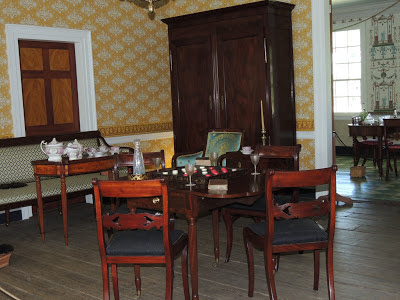This morning I was up with Cal so
that I could take him to the location where he stopped yesterday. However we first stopped at McDonald’s for
breakfast, as the motel did not have much.
Cal continued to ride along LA
#1. The first several miles out of
Donaldsonville had just been resurfaced, so there was a smooth wide shoulder.
Later, even though the shoulder was wide the surface had deteriorated, making it a
rougher ride.
North of White Castle, LA the antebellum
home, Nottoway Plantation, is located along the river road, facing the river. We have been there before, so we were not
going to spend the time to tour the home, but I decided I wanted to drive by it
and take a few photos. I turned off of
LA#1 and found the river road at this location to be smooth and very lightly
traveled. As I rounded the bend, Nottoway
Plantation greeted me, gleaming white in the morning sun. It was simply stunning as you drive around the
bend. I turned around, found Cal, and
told him he has to go that extra mile to see the home. It was worth it!
 |
| Nottoway Plantation House |
 |
| St Louis Plantation House |

Also in this area facing the river, was another antebellum home,
St Louis, but it is a private residence and is not open to the public. After getting to Plaquemine, the shoulder
along LA#1 disappeared so we used the river road (at the foot of the levee) to
get through town. After visiting the
museum at the old locks, we decided to continue on the road along the river at
the foot of the levee rather than to drive LA #1. There is a whole different feel to this
road. History was everywhere and there
was very little traffic in this section of the river. I took photos of the historical markers along
the road which proves to be very interesting and enlightening. There are other antebellum homes along the
river in various states of disrepair. Also there are places where there is a
grouping to “live oak” trees with a place that surely had a home at some point
in history. “If only those trees could
speak!” “Live oak” trees are trees that
stay green all year around – they are not related to the Oak trees we see in
the northern States. The “Live Oak” trees
can live to be 5-600 years old. They not
only have huge trunks, but they can spread out and cover a huge area.
At several points along the road we have been able to observe
farmers preparing the fields for the new sugar cane planting. Southern Louisiana is the sugar cane capitol
of the US. In Iowa we have acres and acres of corn, in southern Louisiana it is
acres and acres of sugar cane. We have
not seen any cotton yet – it is too humid for cotton this far south. This morning when we turned off of LA #1 a
farmer was working in his field right beside the road. Guess what?
We stopped and visited with him!!
 |
| Leveling the Field - Notice the Computer Pivot |
 |
| Tractor with Ridging Disc |



Very briefly: they
first level the field so the water runs to one end or corner of the field, due
to all their rain. This is all computer
controlled. They follow that with a tool
bar, attached to a tractor, with disc clusters that begin the formation of the
ridges where the Sugar Cane is eventually planted. The first of three cuttings, per root stock,
takes 14 months for the plant to be mature. After the third cutting the sugar cane is
removed and soy beans are planted on the ridges either two or three rows per
ridge. After the soybeans, it is back to
sugar cane.
We knew there was a lot of industry along the Mississippi
river, but we really had no idea until this trip. It is unbelievable! Around every bend there is another refinery, another
chemical plant, and another fertilizer plant.
What is produce in this area for the rest of the US is
unbelievable. The river is the source of
transportation for all these products.
We continued on the river road to Allendale. We have been on the west side of Mississippi this whole time. Due to the motel situation we stopped here for the day. We are actually in a motel outside Port Allen. Later this afternoon we went across the river to visit Magnolia Mound Plantation in Baton Rouge. This is a Creole style Plantation home. It is now a museum.
 |
| Magnolia Mound Plantation House |
 |
| Detached Kitchen (Fire Safety) and Garden |
 |
| Living Room |
 |
| Parents Bedroom |
 |
| Kitchen with overhead fan |
 |
| Slave House |
 |
| Inside Slave House |
Tomorrow we will drive back to where we stopped today, and will continue on the river road north to St Francisville where we will cross
the Mississippi.





















No comments:
Post a Comment